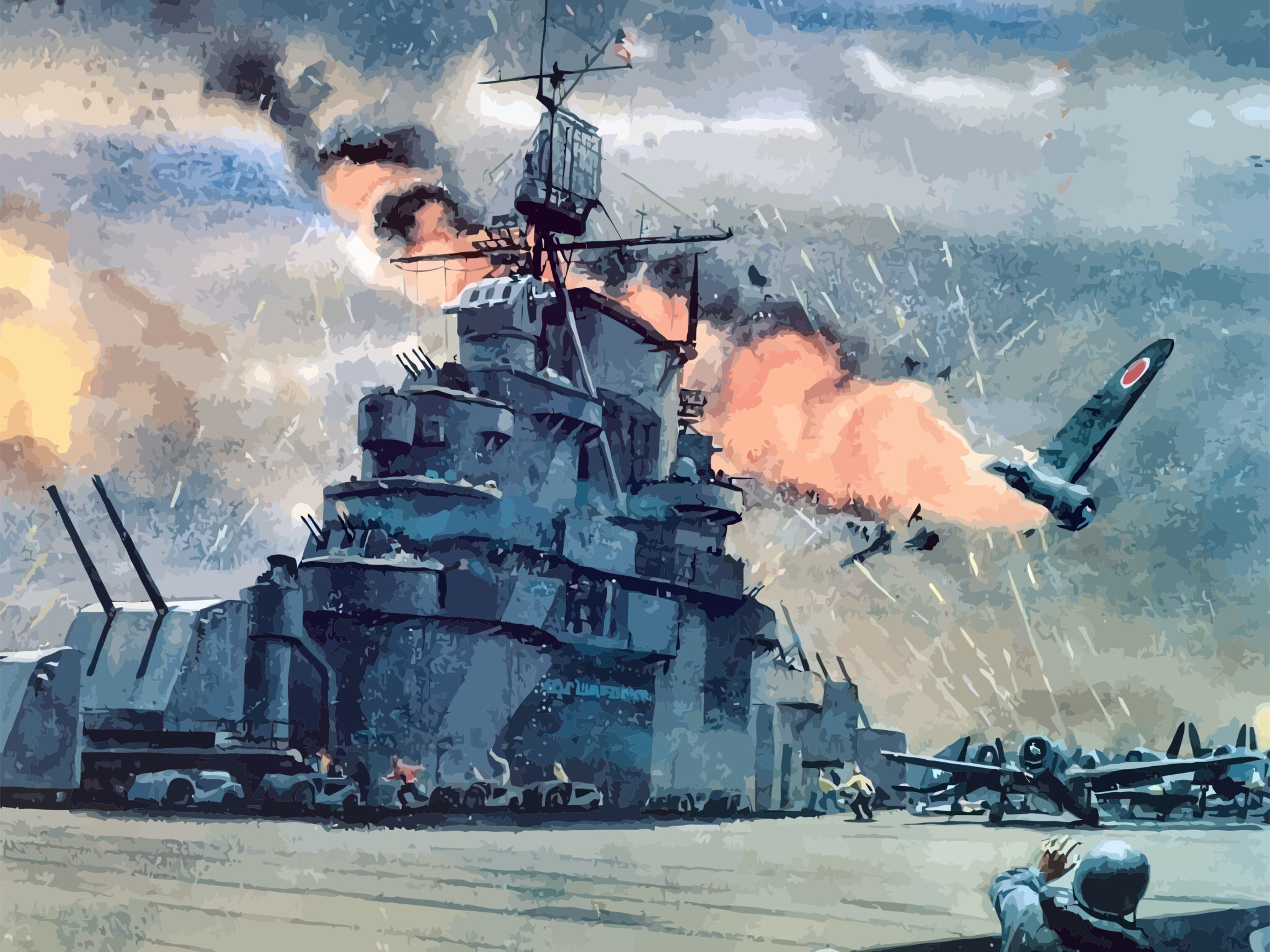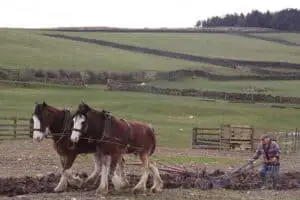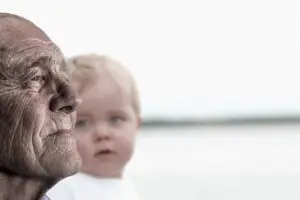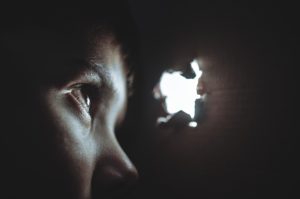
FULL POEM - SCROLL DOWN FOR LINE-BY-LINE ANALYSIS
Her father embarked at sunrise
with a flask of water, a samurai sword
in the cockpit, a shaven head
full of powerful incantations
and enough fuel for a one-way
journey into history
but half way there, she thought,
recounting it later to her children,
he must have looked far down
at the little fishing boats
strung out like bunting
on a green-blue translucent sea
and beneath them, arcing in swathes
like a huge flag waved first one way
then the other in a figure of eight,
the dark shoals of fishes
flashing silver as their bellies
swivelled towards the sun
and remembered how he
and his brothers waiting on the shore
built cairns of pearl-grey pebbles
to see whose withstood longest
the turbulent inrush of breakers
bringing their father’s boat safe
– yes, grandfather’s boat – safe
to the shore, salt-sodden, awash
with cloud-marked mackerel,
black crabs, feathery prawns,
the loose silver of whitebait and once
a tuna, the dark prince, muscular, dangerous.
And though he came back
my mother never spoke again
in his presence, nor did she meet his eyes
and the neighbours too, they treated him
as though he no longer existed,
only we children still chattered and laughed
till gradually we too learned
to be silent, to live as though
he had never returned, that this
was no longer the father we loved.
And sometimes, she said, he must have wondered
which had been the better way to die.

LINE-BY-LINE ANALYSIS
STANZA 1
Her father embarked at sunrise
There exists a satisfying chronology in the poem as it begins alongside the day – sunrise traditionally signifying a hopeful new beginning throughout literature. The tradition of death instead of defeat was deeply entrenched in Japanese military culture during WWII, with the suicide missions of such Kamikaze pilots perceived as loyal and honorable. The destiny of ‘her father’ (the Kamikaze pilot mentioned here) on this day is thereby seen as giving hope to his country during the war, linking to the metaphorical significance of the ‘sunrise’. The tragic irony for him on a personal level, however, is that waking up this morning is not the beginning of a fresh start but the beginning of the end.
with a flask of water, a samurai sword
in the cockpit, a shaven head
full of powerful incantations
This vivid recollection of the objects accompanying the pilot ‘in the cockpit’ as well as his appearance emphasise how deeply ingrained these moments are in his and his daughter’s minds, perceiving them to be his last. His ‘shaven head’ and ‘samurai sword’ are symbols of Japanese military culture, helping to contextualise the poem’s environment – one likely far removed for the predominantly Western audience.
and enough fuel for a one-way
journey into history
This is a dramatic and emotive couplet to conclude this first stanza, harrowingly revealing the pilot’s fatal destiny, with ‘one way’ describing how he and his country intend this to be his final, suicidal mission. ‘Journey into history’ is a metaphor signifying the honor and resultant glory such a mission would entail in line with the aforementioned Japanese tradition of death instead of defeat.
STANZA 2
but half way there, she thought,
recounting it later to her children,
These lines reveal that the narrator is the pilot’s daughter, recounting her perception of his experiences ‘to her children’. It’s evident that this is a second-hand account of his experiences, that she’s unsure of exactly what was going through his mind at the time – perhaps, from her perspective, the poem is an attempt to find closure.
he must have looked far down
at the little fishing boats
strung out like bunting
on a green-blue translucent sea
The narrator recounts what her father saw in what were supposed to be his final moments that ultimately led him to abort his suicide mission. The vibrant, tranquil imagery of the ‘little fishing boats’ floating on the ‘green-blue translucent sea’ led him to the realisation that life was worth living and that the serenity of nature, in particular, was too good to leave behind, even if it meant disobeying his country’s orders and the subsequent consequences.
STANZA 3
and beneath them, arcing in swathes
like a huge flag waved first one way
then the other in a figure of eight,
the dark shoals of fishes
The simile of the fish ‘arcing in swathes like a huge flag’ in the sea below evokes a powerful sense of motion and scale, embodying the omnipotence of mother nature. It’s as if the natural world is reaching out to the pilot, proving to him what he’d be leaving behind and pulling him away from his suicidal fate. The imagery of the ‘dark shoals of fishes’ signifies unity – one of life’s greatest pleasures which links to the fond memories of him and his brothers that he reminisces upon in the following stanza.
flashing silver as their bellies
swivelled towards the sun
This is a visually majestic image – the colour silver associated with wealth and elegance and the sunlight symbolic of power and vitality. The sibilance of ‘silver’ and ‘swivelled’ gives the couplet a rhythmic quality, the flow of which reflects the graceful motion of ‘the dark shoals of fishes’ in the sea below. The effect is, once again, to portray the greatness of Mother Nature and the subsequent hold it has over the pilot, inspiring his survival.
STANZA 4
and remembered how he
and his brothers waiting on the shore
The pilot reminisces nostalgically upon his childhood, a natural response to have when faced with death. Playing with ‘his brothers’ at the beach represents a carefree time in his life that juxtaposes the emotion of impending doom that he’s inevitably grappling with during his mission.
built cairns of pearl-grey pebbles
to see whose withstood longest
the turbulent inrush of breakers
bringing their father’s boat safe
‘Cairns’ of pebbles are used as burial mounds to mark graves. Metaphorically, the way in which the ‘turbulent inrush of breakers’ crash upon and knock them down on the shore is symbolic of the fragility of a person’s posthumous legacy, hence questions the honor supposedly assigned to someone who dies for their country in Japanese culture. The narrator gives the reader an insight into the thought process that led her father to abandon his mission – from recognising the beauty of the world beneath him and of childhood and family to questioning the cultural justification of his death.
STANZA 5
– yes, grandfather’s boat – safe
The repetition of ‘safe’ emphasises the pilot’s shifting motivation to ensure his own safety by aborting his suicide mission.
to the shore, salt-sodden, awash
with cloud-marked mackerel,
black crabs, feathery prawns,
Sensory language in these lines links back to the pilot’s childhood memories, heightening their vividness and thereby highlighting the hold they have over him. Similarly, the sibilance creates a soothing tone when spoken, reflecting the comforting effect this nostalgia has on him.
the loose silver of whitebait and once
a tuna, the dark prince, muscular, dangerous.
The ‘dark prince’ tuna is a metaphor for the prowess of Mother Nature. Its ‘dangerous’ nature is symbolic of how beautiful yet unforgiving the world can be which ultimately translates to its human population and it’s this that has forced the pilot into the position he finds himself in, toying between life and death.
STANZA 6
And though he came back
my mother never spoke again
In this penultimate stanza, it’s confirmed that the pilot did indeed abort his mission and ‘came back’ alive. Shockingly, rather than greeting her husband with relieved joy, the narrator’s ‘mother never spoke [to him] again’, evidently ashamed of his lack of commitment to die for his country. This links back to the aforementioned sentiments entrenched in Japanese culture.
in his presence, nor did she meet his eyes
and the neighbours too, they treated him
as though he no longer existed,
It’s evident that the pilot’s rejection is not confined to his immediate family but to the surrounding society as a whole – treating him as an outcast from the community. There’s a tragic irony here that even though he survived everyone around him would rather he hadn’t and it’s as though this survival instinct was selfish as a result.
only we children still chattered and laughed
The children’s innocence is such that they are the only ones that don’t reject the pilot and treat him ‘as though he no longer existed’. They are naïve to the societal traditions that shape the world around them and have a more humane outlook on life as a result.
STANZA 7
till gradually we too learned
to be silent, to live as though
he had never returned, that this
was no longer the father we loved.
As they grow up the pilot’s children learn about their father’s actions and adopt the cultural values of their community. Consequently, they too begin to banish him from their lives – treating him with silence as opposed to the chatter and laughter of their youth. Describing the pilot as ‘no longer’ being ‘the father we loved’ is a devastating note to draw the poem to a close and demonstrates the harsh manifestation of Japanese culture.
And sometimes, she said, he must have wondered
which had been the better way to die.
The poem concludes with this somber couplet that questions whether suicide and respect would have been a superior alternative to the life of rejection the pilot ultimately endured after aborting his Kamikaze mission. It is a harrowing conclusion that leaves the reader pondering the significance of cultural values and social acceptance in one’s life and whether they could be of greater importance than life itself.


